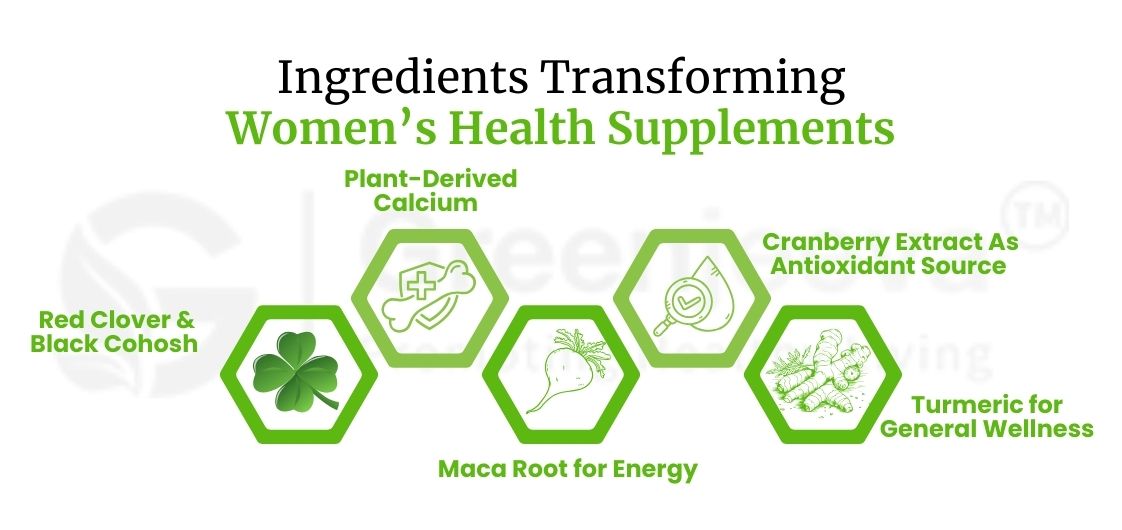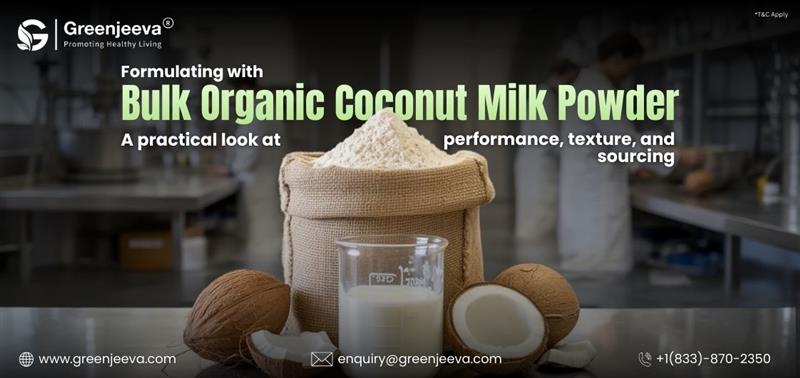Plant-Based Ingredients in Women’s Health Supplements

With increasing consumer awareness around health, sustainability, and dietary preferences, the demand for plant-based options is expanding across multiple industries, including the supplement sector. Women's health supplements, in particular, present a unique opportunity for manufacturers looking to cater to this growing trend. Health-conscious consumers are actively seeking out vegan and plant-derived ingredients that not only support their wellness goals but also align with their values regarding sustainability and animal welfare.
This shift opens a wide array of options for manufacturers interested in enhancing their product offerings. By understanding the primary needs driving the plant-based trend such as ethical sourcing, cleaner labels, and natural ingredient sourcing manufacturers can strategically position their products to better align with market expectations.
Demand for Plant-Based Women’s Health Supplements
The rise in plant-based and vegan lifestyles isn't limited to food; it extends to wellness and health supplements. Recent market studies suggest that nearly 65% of women between the ages of 25 and 45 express a preference for plant-based supplements, especially those formulated for health needs like hormonal balance, bone support, and immune health. The shift towards plant-based is particularly noticeable in younger, health-focused consumers who value transparency and natural ingredients.
Plant-based supplements offer several compelling benefits:
-Natural Alternatives: Consumers favor naturally derived ingredients over synthetic or animal-based counterparts.
-Allergen Reduction: Vegan supplements are often free from common allergens such as dairy, which appeals to consumers with sensitivities.
-Eco-Conscious Choices: Plant-based formulations reduce reliance on animal-derived ingredients, aligning with environmental goals.
Ingredients Transforming Women’s Health Supplements
Manufacturers looking to capitalize on the demand for vegan-friendly women's health supplements can consider incorporating the following plant-based alternatives:
Red Clover and Black Cohosh
Traditionally, animal-derived compounds like conjugated estrogens have been used for women’s hormone-related needs. However, red clover and black cohosh offer effective plant-based alternatives known for supporting hormonal balance, particularly during menopause. Their phytoestrogen content appeals to consumers looking for natural menopause support without animal products.
Plant-Derived Calcium
While conventional supplements use calcium from sources like oyster shells, plant-derived calcium from algae offers a vegan-friendly and highly absorbable option. Algae-based calcium is packed with minerals that support bone density, making it an ideal choice for women-focused formulations aimed at bone health.
Maca Root for Energy
Maca root, a plant native to the Andes, has gained popularity in women’s health for its potential to enhance energy levels, improve mood, and reduce stress. This adaptogenic root is highly marketable as a natural energy booster and hormone balancer for women seeking holistic wellness solutions.

Cranberry Extract As Antioxidant Source
For urinary health, plant-based cranberry extract serves as an effective alternative to synthetic additives. Known for its antioxidant-rich profile, cranberry extract supports urinary tract health and offers an appealing, all-natural option for women seeking preventive care in their supplements.
Turmeric for General Wellness
Curcumin, the active compound in turmeric, is popular and widely accepted in both conventional and plant-based supplements. As a powerful antioxidant, turmeric appeals to women looking for support in joint health, immune resilience, and general wellness.
How Plant-Based Ingredients Enhance Market Appeal
Plant-based women’s health supplements cater to a growing number of consumers who prioritize wellness from a holistic and sustainable perspective. Unlike traditional supplements, plant-based options resonate more with values-driven consumers due to the following reasons:
-Transparency and Clean Labeling: Clean-label ingredients allow manufacturers to be transparent about the origins and benefits of their products, which builds trust with consumers. Plant-based ingredients naturally align with these preferences, providing manufacturers with a straightforward path to more accessible labeling.
-Greater Versatility: Vegan supplements often appeal to a broader market, including consumers with dietary restrictions, making them a versatile choice for retailers and brands aiming to maximize shelf space with adaptable products.
-Ethical and Environmental Responsibility: Many consumers are aware of the environmental impact of animal-derived ingredients and prefer products that reflect their values on sustainability and ethical sourcing. Plant-based women’s health supplements help brands highlight their commitment to ethical practices.
Practical Considerations for Manufacturers
For manufacturers entering the plant-based market, the transition involves several important considerations. Developing products with high-quality plant-based ingredients may require new sourcing partners, formulation adjustments, and regulatory considerations. Here’s what to keep in mind:
-Ingredient Sourcing: Sourcing plant-based ingredients that meet purity and potency standards can enhance a brand’s reputation and ensure product efficacy.
-Certifications: To meet consumer expectations, consider certifications like vegan, non-GMO, and organic. Such labels increase credibility and appeal, especially among discerning consumers in the women’s health market.
-Testing and Transparency: Emphasizing rigorous testing and transparency about sourcing and production processes reassures consumers and adds a level of trust in the quality and safety of plant-based women’s health products.
Conclusion
The plant-based movement in women’s health supplements is more than a trend. It's a shift fueled by rising consumer awareness and demand for healthier, sustainable, and ethical products. Manufacturers who embrace plant-based formulations can lead in this fast-growing market segment, appealing to health-conscious, values-driven consumers.
For businesses ready to innovate, plant-based women's health supplements offer significant opportunities. By integrating these ingredients, manufacturers can enhance their appeal, align with contemporary market trends, and drive consumer engagement.
**The Food and Drug Administration has not evaluated these statements. This product is not intended to diagnose, treat, cure, or prevent any disease.**






